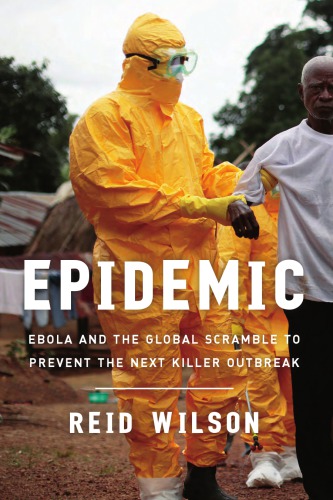
Epidemic
Ebola and the Global Scramble to Prevent the Next Killer Outbreak
ابولا و اسکرامبل جهانی برای جلوگیری از شکست بعدی قاتل
کتاب های مرتبط
- اطلاعات
- نقد و بررسی
- دیدگاه کاربران
نقد و بررسی

February 15, 2018
Three years ago, the Ebola virus killed more than 11,000 people in Guinea, Sierra Leone, and Liberia. Wilson (national correspondent, TheHill.com) provides readers with a detailed account of the 2013-14 epidemic, beginning with the story of patient zero, two-year-old Emile Ouamouno from Guinea, who most likely came into contact with an infected bat. Following the path of the virus as it decimated communities and crossed borders, Wilson painstakingly documents the endeavors of individuals involved in caring for the sick and halting the disease's spread. While recognizing the contributions of West Africans to fight Ebola, Wilson focusses primarily on the global response. The work of NGOs such as Samaritan's Purse and Medecins Sans Frontieres is documented, as well as the efforts of the woefully unprepared World Health Organization. The U.S. response, including the efforts of the Center for Disease Control and the U.S. Army, were instrumental in ultimately curtailing the outbreak. VERDICT With a comprehensive time line, as well as some nail-biting stories of health-care workers infected with Ebola, Wilson's work illuminates the horror of the epidemic and shines a light on how unprepared we are globally to address a future outbreak. Recommended for those with an interest in public health.--Ragan O'Malley, Saint Ann's Sch., Brooklyn
Copyright 2018 Library Journal, LLC Used with permission.

January 1, 2018
A veteran journalist's chronicle of the 2014-2015 Ebola outbreak in West Africa, which struck more than 28,000 people and killed 11,310.Wilson, a national correspondent at the Hill, notes that the Ebola virus was discovered in 1976 in Zaire. Though it caused sporadic and frighteningly lethal outbreaks, it did not sound global alarms except to experts who saw the potential should the virus strike densely populated areas. This is what happened in Guinea, Sierra Leone, and Liberia. Since officials in these countries had not encountered the virus before, there were many initial misdiagnoses. Furthermore, these countries have poor health care systems, few providers or ambulances, and all but impassable roads. Now add in the cultural practice of washing the dead before burial, and it's no wonder that infections spiked. It did not help that the World Health Organization also delayed action. Thankfully, Doctors without Borders, Samaritan's Purse, and a few other groups were there, and they would be joined by other international but largely American agencies. The author's stories of the first victims make for grim reading, but the narrative picks up with U.S. funding for resources and the deployment of thousands of CDC providers working in clinics and Army soldiers building treatment units. Several NGOs also worked with local leaders to organize burial teams, proving that education and building trust can overcome fear. Back in the U.S., Barack Obama faced congressional pressure to ban West African flights and physically quarantine returnees. His critical move was to appoint an "Ebola czar," who coordinated efforts and staved off counterproductive measures. Wilson concludes with some hope for Ebola treatments but also reports of infection aftereffects and the massive damage to West Africa's economy. More importantly, he points out how the world remains woefully unprepared for the next unavoidable epidemic.An important cautionary book that is also oddly exhilarating. At a time when Americans are bombarded with nativism, it's refreshing to read about American volunteers who came through in a crisis affecting some of the poorest nations in the world.
COPYRIGHT(2018) Kirkus Reviews, ALL RIGHTS RESERVED.

























دیدگاه کاربران